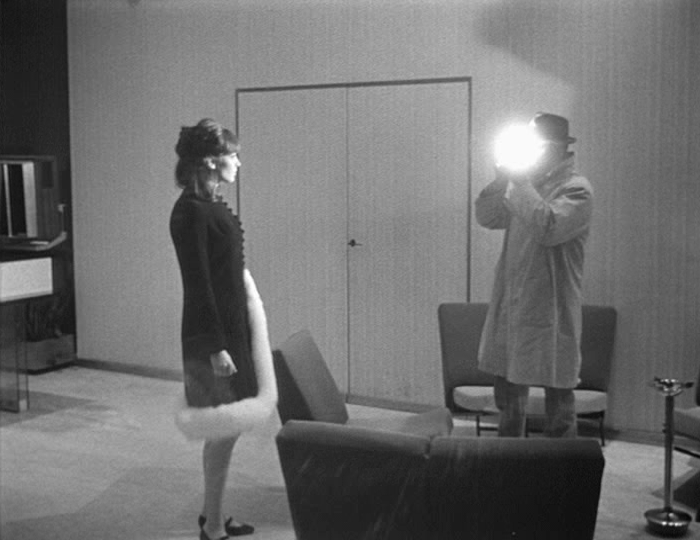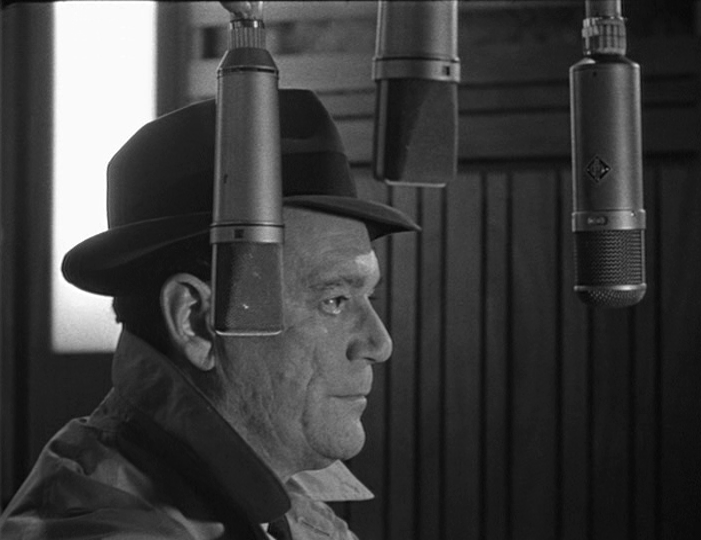

“Once we know the number one, we believe that we know the number two, because one plus one equals two. We forget that first we must know the meaning of plus.”
Jean-Luc Godard’s Alphaville is a bleak futuristic noir marked by eerily accurate predictions of modern ills, a cry of protest aimed at those who prostrate themselves in worship before the altar of science. Cleverly hidden beneath a layer of black comedy, the negative societal developments suggested in the dystopian world of Alphaville aptly characterize the tendencies of mainstream culture in the twenty-first century. Godard’s view—a clairvoyant observation that encroaching technologies would warp human connection—while pessimistic regarding the trajectory of art, is ultimately hopeful that love and individual expression will prevail. A half century of aging has not diminished the film’s style, blunted its humor, or lessened the salience of its warning.
Eddie Constantine portrays Lemmy Caution, a literary character created by Peter Cheyney and a role the actor had played multiple times throughout his career. But he usually played him as a straight detective, which is not the case here. In Alphaville, Lemmy is an agent sent from the Outlands to the titular city on several concurrent missions—to locate a missing agent, to capture or eliminate the architect of Alphaville, and to destroy the sentient computer which controls all life there. While he maintains his B movie charm—American car, raincoat, trilby, Zippo lighter, the whole nine yards—he’s placed into an unfamiliar, vaguely futuristic environment. Godard shoots on the unadorned streets of 1960s Paris, relying on his own philosophically-minded storytelling and poeticism to carry the film, allowing his sci-fi dystopia to be generated primarily by language and attitude.

In the city of Alphaville, individual thought has been outlawed, and concepts like love and poetry have become foreign to its residents. Their bible is a dictionary, which is updated periodically to remove words such as ‘conscience’ that give rise to genuine emotion. They must not ask ‘why,’ but say only ‘because.’ They must not cry. Such things are illogical, and will result in arrest and interrogation. In the dark and depressing world of Alphaville, no one thinks of the past or the future, only the present. Those who struggle to assimilate can be found in shacks with other misfits, where they are constantly encouraged to off themselves. Into this dystopian world we are thrust, guided by voice-overs from both Lemmy and the supercomputer, Alpha 60. Caution meets Natacha von Braun, portrayed by frequent collaborator and then-wife of Godard, Anna Karina. Natacha is the daughter of Professor von Braun, the creator of Alphaville, though she claims to have never met him. She repeats memorized lines about her past, but is unsure of who she really is. She resists the clutches of Alphaville and tries to pry Caution for information about the Outlands, with many of their conversations breaking the fourth wall as Karina addresses the camera directly.
Narration by Alpha 60, guttural and alien, explains why the citizens must live mechanical and orderly lives—it is for the good of society; it is strictly logical to order the citizenry this way. Any thought or action counter to the societal aims determined by Alpha 60 is punishable by public execution. Natacha takes Caution to a “light and sound” event at the Ministry of Dissuasion, where they climb to a vantage above a swimming pool. Down below, we watch as men stand in line at a diving board, waiting to endure a grotesquerie of performative execution. One at a time, the men at the beginning of the line are shot and fall into the pool, where they are pounced upon and stabbed repeatedly by a gang of female swimmers, who then perform handstands and somersaults to rounds of applause. As one man steps forward, Natacha comments, “Say, I know him. He wept when his wife died.”

Godard plays with the noir genre throughout, referencing several classic works and utilizing genre tropes, sometimes bordering on the parodic. Lemmy reads Raymond Chandler’s The Big Sleep as he uses a poster of a nude woman for target practice. When he finds the missing agent, a bumbling alcoholic who failed to accomplish the same mission that Caution is now on, he asks him sardonically, “Is Dick Tracy dead?” The henchmen are nonchalantly taken out in comic fashion in several stylized scenes. As Caution enters his hotel room, a prostitute—ahem, ‘third-class seductress’—who had led him there puts classical music on the jukebox; a moment later he is assaulted by a man whom he dispatches handily as the music plays loudly, masking the sounds of the short fight. In another scene, several jump-cuts show Caution beating up on a henchman in exaggerated action poses, almost like panels of a comic book.
While the film critiques society’s view of women—there are several scenes of women standing on tables as their bodies are evaluated—typical genre tropes are also included: women readily make advances toward the strange man they encounter, Lemmy and Natacha experience an idealized romance, etc. Natacha begins to fall in love with Caution, though she does not know the words to say so. Godard uses art—in this case poetry—as a catalyst for regeneration of the soul. “Are we near to our conscience, or far from it?” Natacha reads. “These are words I don’t understand.”

The flow is somewhat disorienting. There are few establishing shots, and scenes are intercut with flashing images that seem intended as a comment on the constant advertisements of consumerist culture. Coupled with this is Lemmy’s camera, which he uses frequently to catalog his experience; this aptly predicts the modern obsession with documenting one’s entire life. The filmmakers—Godard and cinematographer Raoul Coutard—chose to shoot the film in Paris at night, resulting in large amounts of ‘unusable’ footage. Some of these were used anyway, giving the film a nightmarish quality. Indeed, though the bulk of the film was shot on the unembellished streets, Coutard’s black-and-white photography transforms mundane objects into a convincingly dystopian world—jukeboxes, hotel lobbies, public swimming pools, flophouses. All of them bristle with menace. Toward the end of the film, to illustrate that Lemmy has metaphorically flipped Alphaville on its head, the color scheme is inverted.
Alphaville posits that the consciousness can be awakened from the brainwashed coma of societal control through poetry. The answer to corrupt society is personal creativity and expression. This is how Natacha is finally able to understand love, and how Caution finally defeats Alpha 60. “What is your religion?” the computer asks him. “I believe in the inspirations of conscience.”